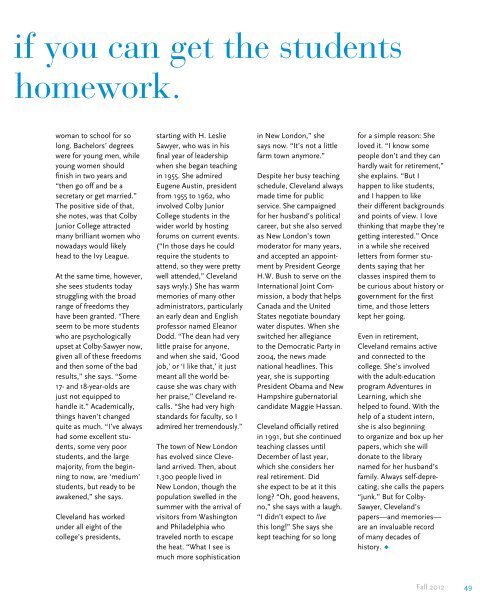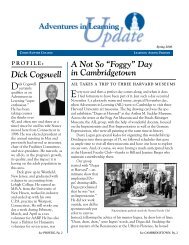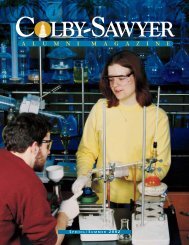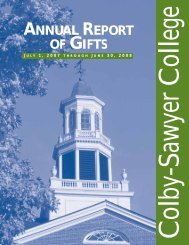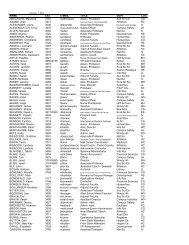Fall 2012 Issue - Colby-Sawyer College
Fall 2012 Issue - Colby-Sawyer College
Fall 2012 Issue - Colby-Sawyer College
Create successful ePaper yourself
Turn your PDF publications into a flip-book with our unique Google optimized e-Paper software.
if you can get the students<br />
homework.<br />
woman to school for so<br />
long. Bachelors’ degrees<br />
were for young men, while<br />
young women should<br />
finish in two years and<br />
“then go off and be a<br />
secretary or get married.”<br />
The positive side of that,<br />
she notes, was that <strong>Colby</strong><br />
Junior <strong>College</strong> attracted<br />
many brilliant women who<br />
nowadays would likely<br />
head to the Ivy League.<br />
At the same time, however,<br />
she sees students today<br />
struggling with the broad<br />
range of freedoms they<br />
have been granted. “There<br />
seem to be more students<br />
who are psychologically<br />
upset at <strong>Colby</strong>-<strong>Sawyer</strong> now,<br />
given all of these freedoms<br />
and then some of the bad<br />
results,” she says. “Some<br />
17- and 18-year-olds are<br />
just not equipped to<br />
handle it.” Academically,<br />
things haven’t changed<br />
quite as much. “I’ve always<br />
had some excellent students,<br />
some very poor<br />
students, and the large<br />
majority, from the beginning<br />
to now, are ‘medium’<br />
students, but ready to be<br />
awakened,” she says.<br />
Cleveland has worked<br />
under all eight of the<br />
college’s presidents,<br />
starting with H. Leslie<br />
<strong>Sawyer</strong>, who was in his<br />
final year of leadership<br />
when she began teaching<br />
in 1955. She admired<br />
Eugene Austin, president<br />
from 1955 to 1962, who<br />
involved <strong>Colby</strong> Junior<br />
<strong>College</strong> students in the<br />
wider world by hosting<br />
forums on current events.<br />
(“In those days he could<br />
require the students to<br />
attend, so they were pretty<br />
well attended,” Cleveland<br />
says wryly.) She has warm<br />
memories of many other<br />
administrators, particularly<br />
an early dean and English<br />
professor named Eleanor<br />
Dodd. “The dean had very<br />
little praise for anyone,<br />
and when she said, ‘Good<br />
job,’ or ‘I like that,’ it just<br />
meant all the world because<br />
she was chary with<br />
her praise,” Cleveland recalls.<br />
“She had very high<br />
standards for faculty, so I<br />
admired her tremendously.”<br />
The town of New London<br />
has evolved since Cleveland<br />
arrived. Then, about<br />
1,300 people lived in<br />
New London, though the<br />
population swelled in the<br />
summer with the arrival of<br />
visitors from Washington<br />
and Philadelphia who<br />
traveled north to escape<br />
the heat. “What I see is<br />
much more sophistication<br />
in New London,” she<br />
says now. “It’s not a little<br />
farm town anymore.”<br />
Despite her busy teaching<br />
schedule, Cleveland always<br />
made time for public<br />
service. She campaigned<br />
for her husband’s political<br />
career, but she also served<br />
as New London’s town<br />
moderator for many years,<br />
and accepted an appointment<br />
by President George<br />
H.W. Bush to serve on the<br />
International Joint Commission,<br />
a body that helps<br />
Canada and the United<br />
States negotiate boundary<br />
water disputes. When she<br />
switched her allegiance<br />
to the Democratic Party in<br />
2004, the news made<br />
national headlines. This<br />
year, she is supporting<br />
President Obama and New<br />
Hampshire gubernatorial<br />
candidate Maggie Hassan.<br />
Cleveland officially retired<br />
in 1991, but she continued<br />
teaching classes until<br />
December of last year,<br />
which she considers her<br />
real retirement. Did<br />
she expect to be at it this<br />
long? “Oh, good heavens,<br />
no,” she says with a laugh.<br />
“I didn’t expect to live<br />
this long!” She says she<br />
kept teaching for so long<br />
for a simple reason: She<br />
loved it. “I know some<br />
people don’t and they can<br />
hardly wait for retirement,”<br />
she explains. “But I<br />
happen to like students,<br />
and I happen to like<br />
their different backgrounds<br />
and points of view. I love<br />
thinking that maybe they’re<br />
getting interested.” Once<br />
in a while she received<br />
letters from former students<br />
saying that her<br />
classes inspired them to<br />
be curious about history or<br />
government for the first<br />
time, and those letters<br />
kept her going.<br />
Even in retirement,<br />
Cleveland remains active<br />
and connected to the<br />
college. She’s involved<br />
with the adult-education<br />
program Adventures in<br />
Learning, which she<br />
helped to found. With the<br />
help of a student intern,<br />
she is also beginning<br />
to organize and box up her<br />
papers, which she will<br />
donate to the library<br />
named for her husband’s<br />
family. Always self-deprecating,<br />
she calls the papers<br />
“junk.” But for <strong>Colby</strong>-<br />
<strong>Sawyer</strong>, Cleveland’s<br />
papers—and memories—<br />
are an invaluable record<br />
of many decades of<br />
history.<br />
<strong>Fall</strong> <strong>2012</strong><br />
49


